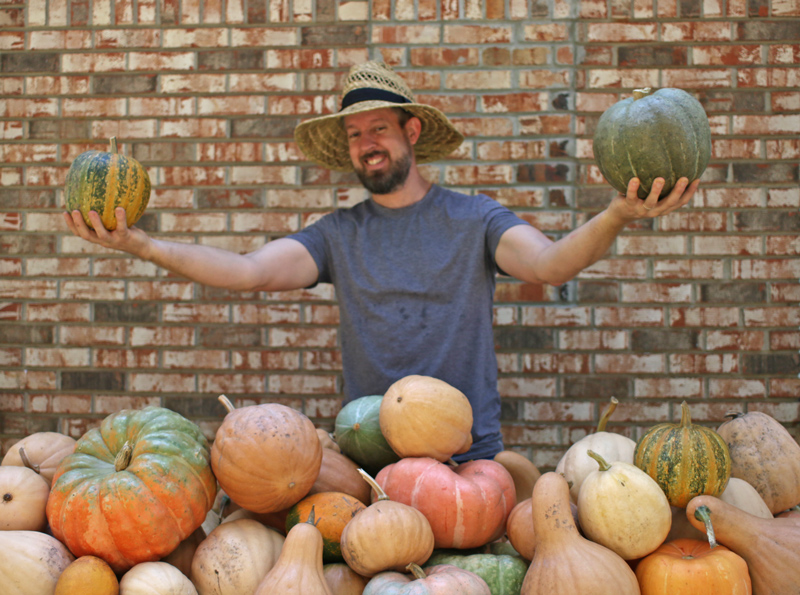Tilhana wonders if squash breeding has to be difficult:
“This is maybe slightly off topic but pertinent to the land race project: I have seen you talk in your videos about breeding pumpkins/squashes and having varieties that you bred/discovered that were really excellent, and keeping the seeds from them and replanting. But I’ve never seen you talk about actively controlling the pollination. I had just assumed that you select pumpkins the way you would other crops: choose the best ones, keep the seeds, replant next year.
But I’ve been reading Carol Deppe’s The Resilient Gardener and she talks about breeding squashes in a way that makes it sounds like something only the most devoted, meticulous, and time-wealthy gardeners can do. She is adamant that if you plant more than one variety of Cucurbita muschata or Cucurbita pepo, they will interbreed, and you will have no way of knowing which ones interbred until the next generation, and that this cross-pollination will destroy any good varieties you happen to discover, so if you want to save seeds, you have to visit the garden every day, tape the flowers shut, and hand pollinate, or else you can only plant one variety from each species, AND make sure you don’t have any nearby neighbors planting another variety because those bees get around.
I am skeptical that this amount of work is necessary. But given the way squash reproduce and express their phenotypes, I have to admit that her point is hard to argue with…surely the varieties will cross-pollinate, and you will have no way of knowing whether the new pumpkins that grow from your seeds will be anything like the parent you were trying to replicate, until it’s too late. And you’d have no way of knowing which seeds, if any, actually possess the traits you are trying to preserve.
So, can you convince me that I can breed squash without making it my full time job? I’m already pretty sure I’m not as picky as Carol Deppe about taste – she seems to be really persnickety about her vegetable varieties. I just want to breed for plants that are mostly edible and resilient enough to thrive on Sheer Total Utter Neglect, or as close as I dare to get to that. Can I do it? How did YOU do it? I can’t see you taping flowers shut and coming back the next day to hand pollinate… so what is the secret? Just getting comfortable with chaos and randomness?”
Yes. Getting comfortable with chaos and randomness is my approach.
I’m not as smart as Carol Deppe is on seed-saving. She’s intense, and follows traditional meticulous breeding practices.
My approach, which is much closer to that of Joseph Lofthouse, is to simply plant good varieties to begin with and then let them cross and see what happens. We always get plenty of good, edible squash. I’m not trying to save summer squash and winter squash of the same species, however. We’re growing all winter squash types, mostly C. moschata, and letting them run together to create our own breed. The ones with the best flavor and vigor we’ll save.
If you start with good parents, you usually end up with good children. I have no desire to tape flowers shut and create lots of breeding paperwork.
I hate the fiddly stuff.
If we like the way it looks or if it tastes good, we save the seeds. Plant them all and let God sort them out.


2 comments
I’m too lazy to hand pollinate anything. I’ve saved pie pumpkin seeds (a c. pepo that had a lot of adventitious roots) and some had accidently crossed with a marrow summer squash. It was the shape of the marrow but still tasted good so I didn’t care all that much. The hand pollination is more for making sure your seed is a particular variety but if you aren’t concerned about that then have fun with planting whatever and saving seeds from them. I have a lot of space so if I plant more than one variety (like pepo…you generally don’t want the z*ucchini and winter varieties to mix) I try to keep them far apart trees or the house in the way. The above mixing was a brain fart where I planted them next to each other.
Thank you – exactly what I was hoping to hear! I am really more drawn to the Joseph Lofthouse style, myself. Replant stuff that worked last year, add some new varieties every year to bring in new genes, harvest what survives, repeat. I’ve always liked leaving some things to fate or randomness (or God – although I am skeptical that he pays attention to such trivialities as my garden). And projects that require that much of a time investment tend to get abandoned halfway through, because I don’t have time to visit the garden every day. So I like an approach that favors more food over pure/perfect varieties.
Comments are closed.